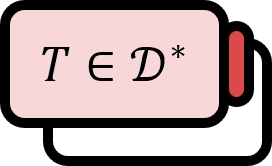디랙 델타 함수는 정칙 초함수가 아님을 증명
정리1
$$ \delta (\phi) := \phi (0), \quad \phi \in \mathcal{D} $$
위와 같이 정의된 디랙 델타 함수는 정칙 초함수가 아니다. 정칙 초함수가 아닌 초함수를 특이 초함수singular distribution라고 한다.
설명
정칙 초함수란 대응되는 국소 적분 가능한 함수 $u$가 있어서 아래와 같이 정의되는 초함수를 말한다.
$$ T_{u}(\phi) := \int u(x) \phi (x) dx,\quad \phi \in \mathcal{D} $$
디랙 델타 함수가 정칙 초함수가 아니라는 말은 아래의 조건을 만족하는 국소 적분 가능한 $u$가 존재하지 않는다는 말이다.
$$ \not\exists u\ \text{s.t. } \int u(x)\phi (x)dx = \delta (\phi) = \phi (0),\quad \phi \in \mathcal{D} $$
증명
귀류법을 통해 증명한다.
다음과 같은 식을 만족하는 국소 적분 가능한 함수 $u$가 존재한다고 가정하자.
$$ \begin{equation} \int u(x)\phi (x)dx =\delta (\phi)=\phi (0),\quad \phi \in \mathcal{D} \label{eq1} \end{equation} $$
이제 아래와 같은 테스트 함수를 생각해보자.
$$ \begin{equation} \eta (x) =\begin{cases} e^{\frac{1}{x^{2}-1}} ,& \left| x \right| <1 \\ 0 & \left| x \right| \ge 1 \end{cases},\quad \eta_{m}(x)=\eta (mx)=\begin{cases} e^{\frac{1}{(mx)^{2}-1}} ,& \left| mx \right| <1 \\ 0 & \left| mx \right| \ge 1 \end{cases} ,\quad \forall m\in \mathbb{N} \label{eq2} \end{equation} $$
그러면 $\eta _{m}$의 그래프는 아래와 같다.

또한 모든 $m$에 대해서 $\eta_{m}(0)=\eta (0)=e^{-1}$을 만족하고, 서포트는 $\mathrm{supp}\ \eta_{m}=[{\textstyle -\frac{1}{m}},{\textstyle \frac{1}{m}}]$이다. 따라서 $\eqref{eq1}$의 적분은 다음과 같이 쓸 수 있다.
$$ \begin{align*} \delta (\eta_{m})&=\int _{\mathbb{R}} u(x) \eta_{m}(x)dx \\ &=\int_{-{\textstyle \frac{1}{m}}}^{{\textstyle \frac{1}{m}}}u(x)\eta_{m}(x)dx \\ &=\eta_{m}(0) \\ &=e^{-1} \end{align*} $$
위 식에 $m \to \infty$의 극한을 취하면 다음을 얻는다.
$$ \begin{equation} \lim \limits_{m\to\infty} \int _{-{\textstyle \frac{1}{m}}}^{{\textstyle \frac{1}{m}}}u(x)\eta_{m}(x)dx =e^{-1} \label{eq3} \end{equation} $$
또한 $\eqref{eq2}$를 생각해보면 $\eta_{m}$의 이미지는 $[0,e^{-1}]$이다. 따라서 $\eta_{m}$은 $e^{-1}$로 바운드되어 있다. $u$도 적분가능하다는 조건에 의해 어떤 $M>0$에 의해 바운드되어 있다. 그러므로 다음이 성립한다.
$$ \begin{align*} \int_{-{\textstyle \frac{1}{m}}}^{{\textstyle \frac{1}{m}}}u(x)\eta_{m}(x)dx &= \int_{\mathbb{R}}\chi_{[-{\textstyle \frac{1}{m}},{\textstyle \frac{1}{m}}]}(x)u(x)\eta_{m}(x)dx \\ &\le \int_{\mathbb{R}}e^{-1}\left| \chi_{[-{\textstyle \frac{1}{m}},{\textstyle \frac{1}{m}}]}(x)u(x) \right|dx \\ &\le e^{-1}\frac{2}{m}M \end{align*} $$
그러면 지배 수렴 정리에 의해서 다음의 식이 성립한다.
$$ \begin{equation} \begin{aligned} \lim \limits_{m \to \infty} \int_{-{\textstyle \frac{1}{m}}}^{{\textstyle \frac{1}{m}}}u(x)\eta_{m}(x)dx &= \lim \limits_{m \to \infty} \int_{\mathbb{R}}\chi_{[-{\textstyle \frac{1}{m}},{\textstyle \frac{1}{m}}]}(x)u(x)\eta_{m}(x)dx \\ &= \int_{\mathbb{R}}\lim \limits_{m \to \infty}\chi_{[-{\textstyle \frac{1}{m}},{\textstyle \frac{1}{m}}]}(x)u(x)\eta_{m}(x)dx \\ & = 0 \end{aligned} \label{eq4} \end{equation} $$
$\eqref{eq3}$과 $\eqref{eq4}$는 서로 모순이므로 가정이 잘못됐음을 알 수 있다. 따라서 디랙 델타 함수는 정칙 초함수가 아니다.
■
Daniel Eceizabarrena perez, Distribution Theory and Fundamental Solutions of Differential Operators (2015), p5-6 ↩︎

 저희들의 저서 「줄리아 프로그래밍」이 2024 세종도서 학술부문에 선정되었습니다!
저희들의 저서 「줄리아 프로그래밍」이 2024 세종도서 학술부문에 선정되었습니다!

